

Freelancers Union - Search for benefits. Freelancers Union, Inc.

(FU) is not a licensed insurance agent. How it works. SkillBridge. A Crowded Space, Marketplaces are Eating Firms (Unedited) Les réseaux nous aident-ils à gérer les transformations du travail. L'environnement professionnel dans la plupart des activités est de plus en plus individualisé.
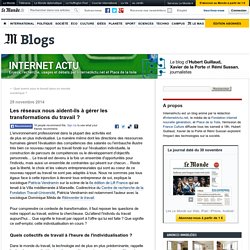
302 Found. In the Sharing Economy, Workers Find Both Freedom and Uncertainty. Photo Just after 4 a.m. on a recent Friday, while most of the neighbors in her leafy Boston suburb were still asleep, Jennifer Guidry was in the driveway of her rental apartment, her blond hair pulled back in a tidy French braid, vacuuming the inside of her car.
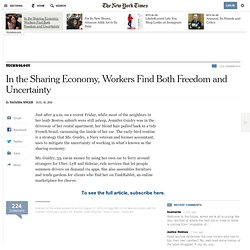
The early-bird routine is a strategy that Ms. Guidry, a Navy veteran and former accountant, uses to mitigate the uncertainty of working in what’s known as the sharing economy. Ms. Guidry, 35, earns money by using her own car to ferry around strangers for Uber, Lyft and Sidecar, ride services that let people summon drivers on demand via apps. Her goal is to earn at least $25 an hour, on average. The great middle-class identity crisis. ‘Fewer stay in the same profession for life.
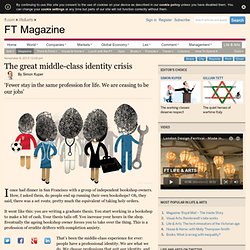
We are ceasing to be our jobs’ America, say goodbye to the Era of Big Work. For much of the past century, the Era of Big Work — the 40-hour workweek and its employer-provided benefits — were the foundation of our economy.
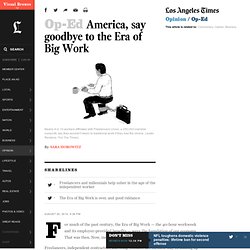
That was then. Now, independent work is the new normal. Freelancers, independent contractors and temp workers are on their way to making up the majority of the U.S. labor force. They number 42 million, or one-third of all workers in the nation. That figure is expected to rise to 40% — some 60 million people — by the end of the decade. Lâchez-nous avec la valeur travail ! Voici venu le temps des contradictions.
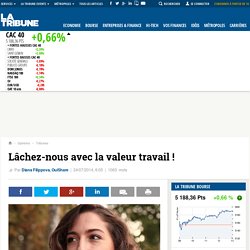
Disruptive technologies: Advances that will transform life, business, and the global economy. The relentless parade of new technologies is unfolding on many fronts.

Almost every advance is billed as a breakthrough, and the list of “next big things” grows ever longer. Not every emerging technology will alter the business or social landscape—but some truly do have the potential to disrupt the status quo, alter the way people live and work, and rearrange value pools. It is therefore critical that business and policy leaders understand which technologies will matter to them and prepare accordingly. Why We’re in a New Gilded Age by Paul Krugman. Capital in the Twenty-First Century by Thomas Piketty, translated from the French by Arthur Goldhammer Belknap Press/Harvard University Press, 685 pp., $39.95 Thomas Piketty, professor at the Paris School of Economics, isn’t a household name, although that may change with the English-language publication of his magnificent, sweeping meditation on inequality, Capital in the Twenty-First Century.
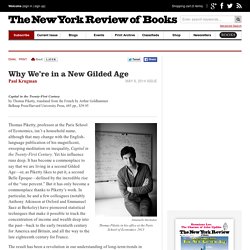
What Role Does Technology Play in Record Levels of Income Inequality? The signs of the gap—really, a chasm—between the poor and the super-rich are hard to miss in Silicon Valley.
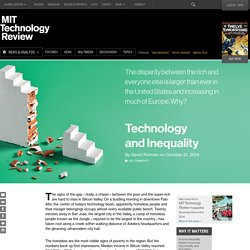
On a bustling morning in downtown Palo Alto, the center of today’s technology boom, apparently homeless people and their meager belongings occupy almost every available public bench. Twenty minutes away in San Jose, the largest city in the Valley, a camp of homeless people known as the Jungle—reputed to be the largest in the country—has taken root along a creek within walking distance of Adobe’s headquarters and the gleaming, ultramodern city hall. Inégalités et protection sociale après la révolution numérique (with image, tweets) · Nicolas_Colin. Tours of Duty: The New Employer-Employee Compact. For most of the 20th century, the compact between employers and employees in the developed world was all about stability.
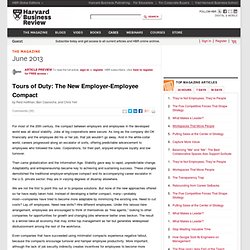
Jobs at big corporations were secure: As long as the company did OK financially and the employee did his or her job, that job wouldn’t go away. Note emplois. La «révolution des métiers» dans les entreprises est en marche. Dico du futur. Signal (économie) Un article de Wikipédia, l'encyclopédie libre. En économie un signal est une information donnée par un émetteur qui aide le récepteur à prendre une décision. Il est donc nécessaire dans des jeux de principal–agent afin que l'agent se signale et que le principal interprète ce signal.
La question de la crédibilité du signal est elle aussi importante car même un signal non crédible donne tout de même plus d'information qu'une absence de signal. La transparence de l’information : l’information parfaite de tous les agents sur tous les autres et sur le bien échangé suppose une information gratuite et immédiate ; la théorie montre que le processus de fixation des prix est alors équivalent à la présence d’un « commissaire-priseur », qui centralise les offres et les demandes, et qui calcule le prix d’équilibre, et par conséquent la production et la consommation de chacun. On suppose l’absence d’échange de gré à gré. La nécessité de signaux est donc capitale lors de transactions économiques. .